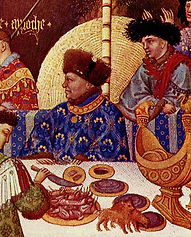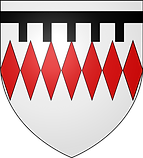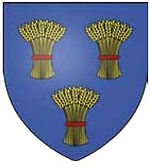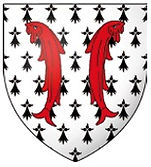
Jean de Berry (1340 - 1416)
“Son, Brother and uncle of king of France”, Jean de France alias Jean de Berry receive as prerogative the duchy of Berry created especially for him in 1360 by his father Jean II the Good, in order to insure him lands and a hierarchical position. He united duchies of Berry, of Auvergne and the county of Poitou. He had two wifes : Jeanne of Armagnac, then the young Jeanne of Boulogne. As son of the King, the duke take part in the government of the Kingdom, notably the diplomatic missions and the military commandment in times in war. Today, we remember him as a great collector, patron, and builder even though he’s also known, in a less flattery way, for his political and fiscal choices, which wasn’t necessarily meant for the common welfare.
Bertrand du Guesclin (1320 - 1380)
Bertrand is engaged in the success wars of Britain, then the Spanish civil war at the request of the King of France. He’s made Constable of France in 1370 by Charles V. His main quest is to expel the english of the Kingdom. He achieves his mission methodically by provinces and by castle rather than by big campaigns. At the time of his passage in Berry in 1372, he took back Chauvigny and Sainte-Sèvere to the english.

Guy II de Chauvigny

Guy II fought under the banner of king Charles V and under the commandment of Bertrand du Guesclin in 1369. He’s also familiar with the Duke Jean of Berry. After a long trial which oppose him to Jean de Villemur, he took back the fortress of Cluis Dessous in 1401. Guy II lived there until his death in 1422. He surrounded himself of an important court and initiate great works
Guy III de Chauvigny
Man of war alongside the King of France despite the plots and conspiracy, he’s also an actor of the ride of Joan of Arc toward Orléans then Reims. He stood in good position in the battle of Patay (1429). This lord, relative to the Court, participated actively to events that occurred at the end of hundred years war before returning to his lands.

Louis de Culan (~1375-1444)
Lord of Culan and cousin of Jean de Brosse, he’s also an accomplished soldier and commandant. He assist his cousin at the head of the rescue army of Orléans . His charge of admiral de France, received in 1421, is mainly honorary. After Orléans, he’s in every combats for reconquering the kingdom. The king rewards him by tasking him to bear the holy ampoule.

Jean de Brosse ( ? - 1433)
Lord of Boussac and Sainte-Sévère, he’s a heir of the viscount of Brosse. Made Marshall of France in 1427, he’s the commandant of the army sent to rescue of Orléans, besieged by the English. Relative to Joan of Arc and the King who made him one of the bearer of the Holy Ampoule after his coronation at Reims. However, his military mission cost him his live, he dies, lumbered with debts, after many fights.


Jean de Naillac ( ? - 1429 )
This berrichon lord is the inheritor of the Naillac Castle. He’s the brother-in-law of Jean de Brosse and the son in law of Raoul de Gaucourt. It show the family and interests relationships of the lords that escorted Joan of Arc. However he dies before seeing the success of France, during the battle of Harengs (1429)
Raoul VI de Gaucourt ( 1374 - 1462)
This lord is not from Berry, but he settles in the region after his marriage with Jeanne of Preuilly, chatelaine of Naillac and Cluis. In 1428, he’s the governor of Orléans during the English Siege. He doesn’t stay inactive .. blocus and looks for help in the royal Court where he meets Joan of Arc. During the reconquest of Normandy, he’s made prisoner many times but bought back to the english. He begun a more diplomatic career, and is one of the most important witness during the trial of Joan of Arc in 1455.


Antoine de Prie ( ? - après 1481 )
Brother of Jean of Prie, Lord of Buzainçais, and captain of the “Grosse tour” of Bourges where he died in 1424, he succeeded Jean of Prie after his death. He’s the lord of Montpoupon and Moulin sur Céphons where archaeologists found trace of destruction linked to the Hundred Years war. He’s made chamberlain of the King and master chef of France, officer who supervise the kitchen of the Royal Court.
Jacques II de Bourbon
From 1357 to 1438, the dukes of Bourbon are lords of Crozant. Warchief, captured by the turks in 1396, Jacques II is freed in 1398. He goes back in expedition in England in 1404 where he’s beaten. At the same time, he encourages the cities of the High March to fortify their walls against english armies and fights the Armagnac for the Duke of Bourgogne. Thrice married, he hope to be King on the lands of his spouse in Sicily or at Naples. He fails and comes back to France in 1422. He enters into religion in 1435 and died in Besancon in 1438.
Huguet de Chamborand (~1410 - 1481+)

Born near 1410 at the Lavaud Manor (Measnes, Creuse) Huguet de Camborand fights under the order of the Marshall of Sainte-Sévène in Orléans in 1429. He’s made prisoner near Beauvais two years later. Released for ransom, he serves Jean of Blanchefort and loot the region of La Souterraine. After kidnapping and force married the daughter of the Lord of Motte Feuilly, he’s know for many exaction in the south Berry, til an advanced age : Fire, murder, violence, fake documents. He always came out unscathed of his attacks and legal actions. He dies after 1481, old and wealthy. Therefor he endow his daughter of 10 000 gold ecus, including 4 000 in jewelry and precious gems.
Régnier Pot (~1362 - 1432)
Knight of the Pot family, and knight of the Golden Fleece Order, he’s one of the most important advisor in the Court of the dukes of Bourgogne. Lord of La Prugne (in Berry, know today as La-Prune-au-pot) by inheritance, he acquire many lands in Bourgogne like Roche Nolay for example (La Rochepot today), Thorey, chamlard, Melissey. He was Chamberlain and advisor of the dukes of Bourgogne and governor of the Dauphiné an advisor of Charles VI.
The Pot Family was an actor of the history and major events of its time thanks to a growing importance during the period. At first by administering little seigneury in Berry then at the service of the dukes of Bourgogne, kings of France and foreign leaders, they’ll raise themself to the highest functions.




